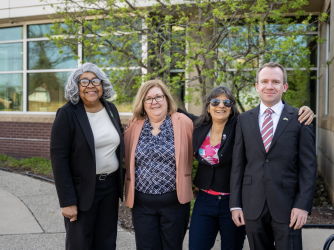Table of Contents
Problems with University Bias Policies and Attempts to Improve Campus Climate
This fall, FIRE is writing a blog series about how schools can reform their problematic speech codes and earn a "green light" rating from us—a distinction currently awarded to just 15 of the more than 400 schools in our Spotlight database, but one we hope to be able to award to many more in the years to come. In this series, we are discussing common problems with campus speech codes, focusing on examples from schools that are just a few small changes away from earning a green light rating. So far, we have examined how universities restrict speech by mandating "civility," improperly broadening the definition of "harassment," restricting students' online expression, and placing undue restrictions on campus postings and on student protests and demonstrations. Today we wrap up this series with a discussion of overly broad policies on "bias" and "intolerance."
Universities frequently have the best of intentions when they enact policies on bias and intolerance. But since most speech that people would consider "biased" or "intolerant" is protected by the First Amendment, schools must find ways to improve the campus climate and provide support to affected students without infringing on other students' free speech rights.
At some schools, any "biased" or "intolerant" speech is prohibited, which is a clear and substantial First Amendment violation. At many other schools, the problems are more subtle. Some schools, for example, chill protected speech by encouraging students to report any "biased" expression to the university and promising to investigate all reports. Even if protected speech is ultimately not punished at these schools, the potential of being subjected to an official investigation will be enough to deter many students from expressing controversial or dissenting opinions, leading to an impermissible chilling effect on speech.
Scripps College in California, for example, defines bias incidents as "expressions of hostility against another person (or group) because of that person's (or group's) race, color, religion, ancestry, age, national origin, disability, gender or sexual orientation," and states:
If you witness or experience conduct that discriminates, stereotypes, excludes, harasses or harms anyone in our community based on their identity (such as race, color, ethnicity, national origin, sex, gender identity or expression, sexual orientation, disability, age or religion) please report it to the College.
Although the policy notes that bias incidents do not include speech protected by the First Amendment, college students are unlikely to be familiar enough with the specifics of First Amendment law for this "savings clause" to have any meaningful effect on their willingness to speak out. As a federal judge wrote in holding that San Francisco State University's speech codes likely violated the First Amendment,
We must assess regulatory language in the real world context in which the persons being regulated will encounter that language. The persons being regulated here are college students, not scholars of First Amendment law.... What path is a college student who faces this regulatory situation most likely to follow? Is she more likely to feel that she should heed the relatively specific proscriptions of the Code that are set forth in words she thinks she understands, or is she more likely to feel that she can engage in conduct that violates those proscriptions (and thus is risky and likely controversial) in the hope that the powers-that-be will agree, after the fact, that the course of action she chose was protected by the First Amendment?
Other bias policies are so vaguely written that they could well be enforced to include protected speech. The U.S. Supreme Court has stated that a law or regulation is unconstitutionally vague when it does not "give a person of ordinary intelligence a reasonable opportunity to know what is prohibited, so that he may act accordingly." Grayned v. City of Rockford, 408 U.S. 104, 108 (1972).
At Furman University in South Carolina, "acts of intolerance" are prohibited. The university defines acts of intolerance as "malicious behaviors that can be motivated by prejudice towards a person or group," including "verbal attacks" that "cause harm." Since "attack" and "harm" are not defined, they could presumably include anything from actual harassment to a harshly worded expression of opinion that leaves someone with hurt feelings. Since students have no way to know how the university will interpret the provision, they will more than likely err on the side of caution and refrain from anything that might run afoul of the policy.
Similarly, Duke University policy states that:
A bias incident is an act or behavior motivated by the offender's bias against the facets of another's identity. Bias occurs whether the act is intentional or unintentional. Bias may be directed toward an individual or group. Bias may contribute to creating an unsafe/unwelcoming environment.
The policy provides a wide range of possible university actions in response to a bias incident report, ranging from promoting campus dialogue to referring to the student conduct office. There are no guidelines as to when a bias incident constitutes a conduct violation as opposed to when it is simply an occasion for the university to respond with more speech, so students have no way to know what is actually prohibited under the policy.
Universities can successfully maintain policies that strike an appropriate balance between protecting student speech and maintaining a positive campus climate. The University of Virginia, for example, encourages student reporting of "bias complaints," but makes clear that its definition "is used for reporting and statistical purposes only" and "carries no independent sanctioning authority." It also states that protected speech is not only not subject to punishment, but is not even grounds for "formal investigation." Similarly, Michigan State University's bias incident reporting policy provides that "A bias incident that is not an act of discrimination or harassment prohibited under the Anti-Discrimination Policy may only be recorded for internal monitoring purposes in order to target resources and support to specific areas within campus."
The University of New Hampshire's policy not only states that constitutionally protected speech is not punishable, but also provides clear examples of protected speech (such as "offensive and hurtful expressions that are vague and do not convey a specific and imminent threat of harm" and "parody, ridicule, and satire") rather than assuming that students will simply know what is and is not protected.
So as you can see, universities need not choose between protecting students' free speech rights and supporting an inclusive campus environment; they simply must craft narrowly tailored policies that make clear to students that they will not face discipline or investigation simply for engaging in protected expression.
This concludes our blog series on common problems in university speech codes. We hope that all of the schools that are close to earning a green light from FIRE will apply the easy fixes detailed in these blogs to improve the climate for campus speech and earn FIRE's most favorable rating. And as always, we are ready to help.
Recent Articles
FIRE’s award-winning Newsdesk covers the free speech news you need to stay informed.

VICTORY: Michigan town declares Sept. 6 ‘First Amendment Day’ after FIRE sues its mayor for shouting down residents

USC canceling valedictorian’s commencement speech looks like calculated censorship

Back into the FIRE: Hasen’s response to FIRE and Rohde: Don’t read the press clause out of the Constitution — First Amendment News 420
